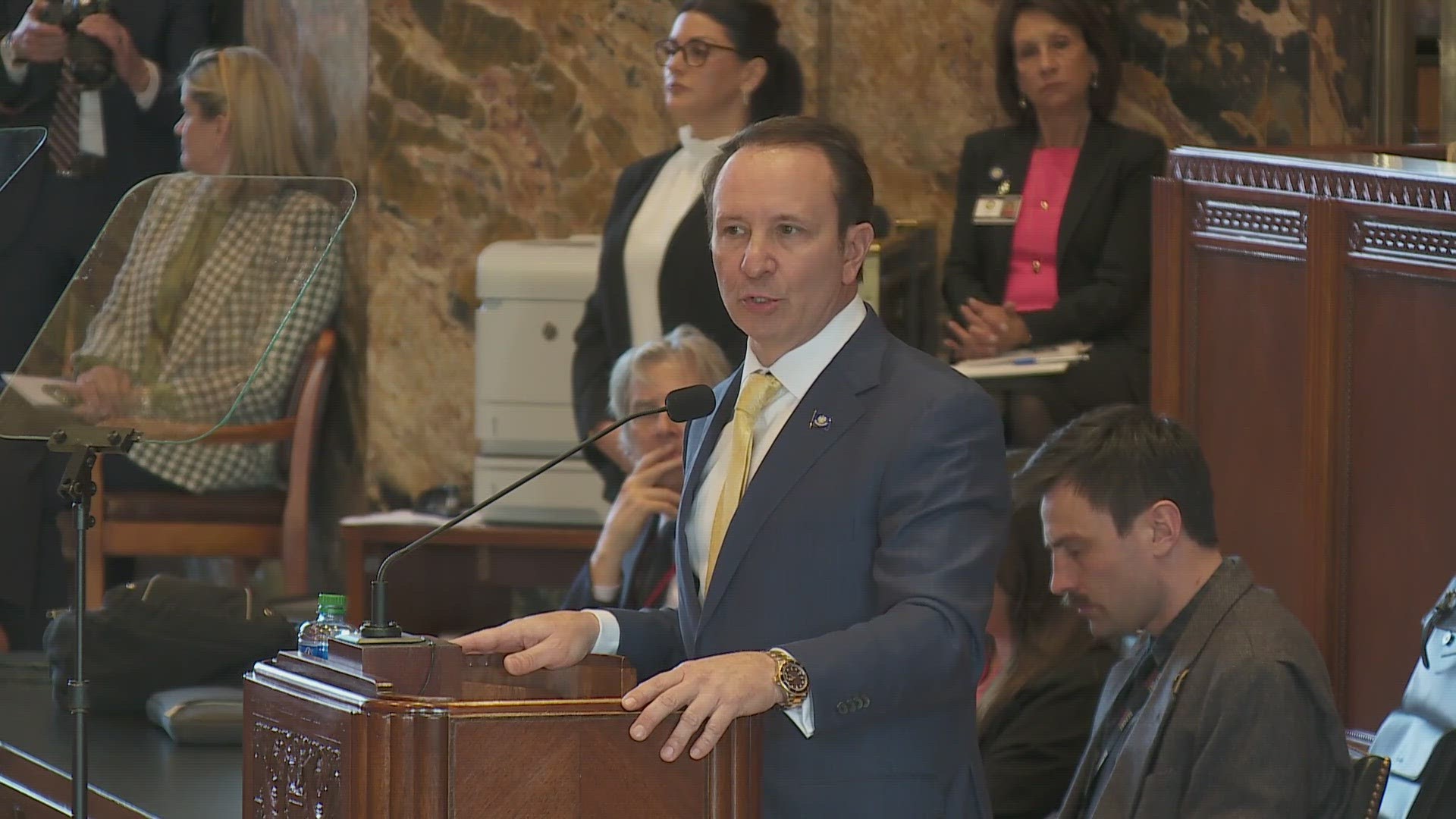BATON ROUGE, La. — Newly-elected Republican Gov. Jeff Landry called on lawmakers Monday to erase many of the criminal justice reforms signed by his Democratic predecessor in 2017, urging them to limit parole and good time, expand the death penalty, and toughen juvenile justice.
Landry said criminal justice has “forgotten” crime victims and their families, including the more than two dozen he asked to stand in the House balcony overlooking the joint session of the Legislature. He cast those promoting efforts to reduce the state’s high incarceration rates as “radical activists hard at work to empty our prisons.
“The propensity of some to signal their virtuous compassion for criminals has become a liberal custom to many,” Landry said. “Without forethought of the consequences to society and the danger it creates in our neighborhoods and homes.”
Though Landry and other conservatives blame the criminal justice reforms for increases in crime, critics point out that crime rose across the nation during the pandemic, a trend that Baton Rouge and New Orleans have started to reverse. The 2017 criminal justice reforms passed with bipartisan support and were signed by a Democratic governor, John Bel Edwards.
Republicans hold a supermajority in each chamber, and lawmakers have already filed more than two dozen bills in the special session that can run until March 6. The proposals can only cover topics laid out by Landry’s 24-item agenda for the session.
House Minority Leader, Rep. Matthew Willard, D-New Orleans, a leading member of the House Democratic Caucus, repeatedly objected to the House rushing bills to committee without discussion on the floor.
“There is no reason for us to move things quickly.” Willard said, adding, “We should take our time, be deliberate about our actions and give the public adequate time to review proposals and to weigh in on those proposals.”
The Democratic Caucus said they did not have input on the legislation and feel Landry’s proposals do not address crime in a holistic way, instead taking a reactive approach that disregards what they believe are root causes of crime, such as mental health and substance abuse.
Despite the objections of Willard and members of the House Democratic Caucus, the majority of the House voted to suspend the rules and refer the bills to committees.
One bill would allow death penalties to be carried out through electrocution, nitrogen gas, and lethal injection, following the nation’s first execution by nitrogen in Alabama last month. If it passes, Louisiana will join Alabama, Oklahoma, and Mississippi in allowing nitrogen as an execution method. Louisiana has not executed a death-row inmate since 2010.
Landry said alternative execution methods would only be used if the drugs for lethal injections could not be obtained, which has halted executions in the past.
“When these sentences are handed down, they form a covenant between the state and the victims, and their family and their friends,” Landry said. “Justice requires that we uphold that covenant.”
While Landry proposed more executions by more means, he called for less transparency around those deaths. He asked for legislation that “would declare any and all records or information pertaining to carrying out a sentence be strictly confidential and not subject to public disclosure.”
Another proposal would treat 17-year-olds as adults in the criminal justice system, a reversal of the state’s 2016 “Raise the Age” law, which mostly treated those younger than 18 as juveniles. A different bill — which Landry called “transparency legislation” — would allow greater online access to data and records from the juvenile justice system.
“These juveniles are not innocent children any longer; they are hardened criminals,” Landry said.
Other bills seek to narrow parole opportunities, increase penalties for carjackings to five years from two years (and impose a minimum of 20 years if there is bodily harm), and create a state public defense office under the governor. Landry also lambasted the reduction of sentences for good time, calling the practice “a participation trophy for jail.”
At the same time, Landry has urged lawmakers to pass legislation allowing concealed weapons to be carried without a permit. He said, “lawful gun owners are our most law-abiding citizens.”
“This body has repeatedly passed it,” Landry said. “Now, you have a governor who will sign it,” he said, flinging his arms open to a standing ovation. He also called for qualified immunity for law enforcement officers, which would limit their vulnerability to lawsuits.
Though lawmakers remained poised for disagreement over the coming days, they united in recognizing the crime victims who came to the Capitol. “To the ladies and gentlemen of this Legislature, I say, let this session be about them,” Landry said, motioning to the crime victims, “and those who protect us.”
► Get breaking news from your neighborhood delivered directly to you by downloading the new FREE WWL-TV News app now in the IOS App Store or Google Play.

